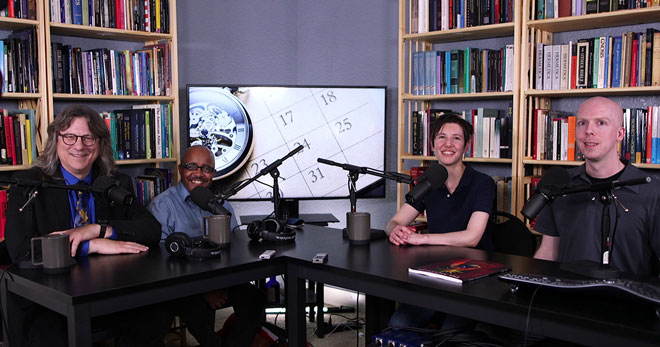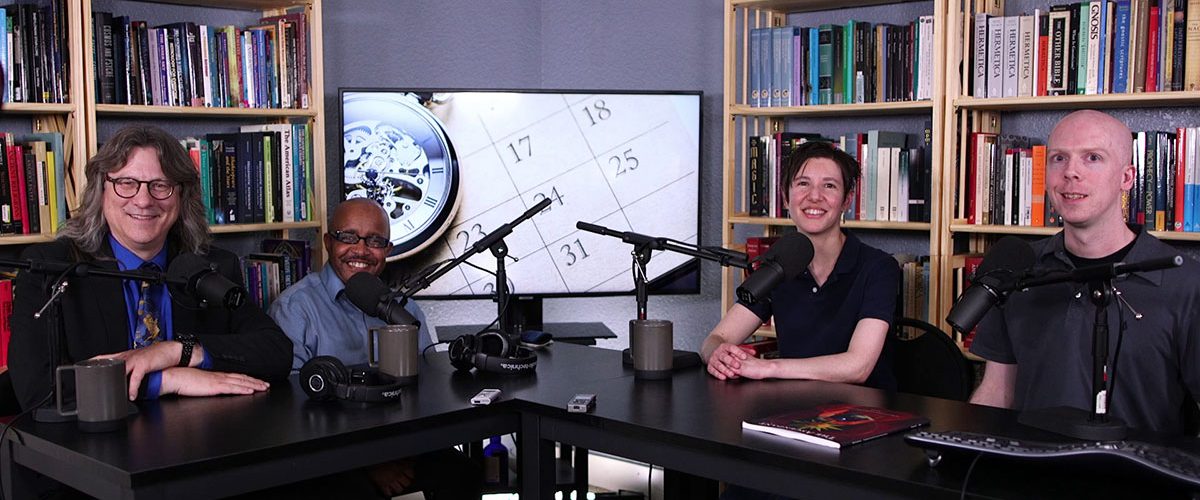
In episode 202 astrologers Kenneth Miller and Sam Reynolds join Leisa Schaim and Chris Brennan in the studio to talk about the history behind Pluto’s significations, as well as the meanings of the other outer planets in general.
This discussion is partially based on a paper that Kenneth wrote for the second volume of The Ascendant journal, titled “Pluto’s Weird History: Dumb luck? Dumb note? Dumbbell?”
In the article Kenneth chronicles the development of Pluto’s significations by astrologers after it was discovered in 1930, and the surprising lack of consistency until the mid-1970s.
This ended up being the basis for a sweeping discussion about how astrologers develop interpretive meanings for new celestial bodies, and some of the pros and cons for different approaches.
Sam and Kenneth were in town this week for a planning meeting with the rest of the board of the International Society for Astrological Research (ISAR), which is hosting their next astrology conference here in Denver in September of 2020.
We decided to take the opportunity while they were in town to meet up and get to the bottom of this whole outer planet issue.
This episode is available in both audio and video versions below.
Timestamps
Here are some timestamps for topics covered at different points in the episode:
00:00:00 Intro
00:04:58 Kenneth’s Pluto article in The Ascendant
00:08:43 Sam’s perspective on outer planets
00:14:39 Political issues of outer planets
00:16:03 Brief history of outer planets
00:18:30 Rulership scheme
00:19:25 Indian tradition and outer planets
00:20:27 Shortcoming of traditional astrology criticisms
00:23:48 Thema mundi and masculine and feminine
00:24:40 Does astrology need to adapt to modern society?
00:28:10 The hiddenness of the outer planets
00:31:08 Different views of function of Pluto
00:33:52 Multi-valence of Pluto
00:35:00 The Pluto keyword Sam dislikes
00:40:00 Pluto’s demotion from a planet
00:42:04 Outer planet significations
00:46:07 Therapeutic blaming of the planets
00:47:30 Haphazard naming of outer planets
00:56:57 Robert Hand’s influence
01:04:30 Pluto, Scorpio and the 8th house
01:05:50 Focus on Pluto in modern astrology
01:11:40 Influence of cultural beliefs
01:13:09 Trend in names of new planetary bodies
01:17:10 Lack of modifiers for the outer planets
01:20:12 How to talk about Pluto to a beginner
01:25:10 Octaves and overlap of inner and outer planet significations
01:33:04 Outer planets and profections
01:34:40 Transiting Neptune on the ascendant
01:36:00 Nocebo effect with outer planets
01:37:41 Rise of mythology in 20th century
01:39:40 Synchronicity in naming of planets
01:41:50 Pluto of less importance since its demotion?
01:48:50 Using caution with new discoveries
01:51:52 Keiron Le Grice
01:53:15 Alan White quote about Pluto
01:54:15 Closing remarks
Watch The Video Version of this Episode
Here is the video version of this episode of the podcast:
–
Transcript
A full transcript of this episode is available: Episode 202 transcript
Listen to the Audio Version of This Episode
You can either play this episode of the podcast directly from the website or download it as an MP3 to your computer by using the buttons below:
Podcast: Play in new window | Download (Duration: 1:57:59 — 81.4MB)


Regarding the importance of the synchronicity in the discovery of Pluto (1930), I believe it was important in foreshadowing world
war 2 a few years after its discovery (only war where nuclear weapons were actually used, showcasing its truly destructive power). In the same year Pluto was discovered (1930), Otto Hahn wrote an article with his prophecy “The Atom – the source of power of the future?” in the newspaper ‘Deutsche Allgemeine Zeitung’. Hahn later proved nuclear fission experimentally by bombarding uranium with fast neutrons, marking the beginning of the nuclear age.
I suspect it was demoted in 2006 due to the drop in the threat of an imminent nuclear war. The ‘atomic age’ was basically the news of yesterday as it conjured images of the fall of the Soviet Union. Furthermore, in 2006, Patrick Moore, a founder of Greenpeace and other environmentalists such as Stewart Brand suggested the deployment of more advanced nuclear power technology for electric power generation (such as pebble bed reactors) to combat global warming (got this from wikipedia, but i’ll check myself to make sure the date is accurate). Hence, Pluto was now being used productively to help society instead of destroying it. In fact, from 2006-2009, a number of nuclear engineers began to suggest that, to combat global warming, it would be more efficient to build nuclear reactors that operate on the thorium (instead of plutonium) cycle .
Unbelievable! It’s the first time you dedicate a podcast episode to Pluto, and instead of inviting people who have actual experience with Pluto, or have devoted their research on this planet, we get 4 anti-Pluto astrologers with almost no Pluto experience and knowledge, obviously biased.
Have a look at what people google on the internet, on what they want to learn about: it’s Pluto, not Mercury, Mars or Jupiter. Is not the astrological community who is pushing for Pluto, it’s the people who want to learn about this archetype, is the people who think Pluto is important.
But no, you have two guests with no real Pluto experience + with egos bigger than Jupiter to talk about Pluto! Samuel and Kenneth will never understand Pluto, because their egos are too big to understand a planet that symbolizes the death of the ego. It’s laughable to see they still feel entitled to have strong opinions about Pluto, and link it to consumerism (?) and love (?).
And make the bold statement that Pluto is not important. Not that Pluto itself cares about being acknowledged. He doesn’t have an ego, unlike the people who feel entitled to talk about what they don’t understand 😉
Still, what a disappointment.
I haven’t had a chance to watch the podcast yet, but I’m intrigued by Mr Galt’s comment (see above) and I am looking forward to hearing all these anti-Pluto sentiments, however much I may or may not share them!
In fairness to the Astrology Podcast, Mark Jones (Healing the soul: Pluto, Uranus and the lunar nodes) has been on at least two episodes that I have listened to. Mark Jones is fairly pro-Pluto,I should think, thus balancing things out nicely! 🙂
I wish someone would dive into the politics of astrology. What’s the politics of seeking knowledge about yourself outside yourself. Empowering or disempowering. A path towards self realization or an abdication of personal responsibility for who you are. Or both.
I just listened to the entire episode, it’s not anti-Pluto, at all.
One of the panelists had just written an article studying the evolution of the various delineations of Pluto from the time of its discovery in the 1930s, up through Isabel Hickey’s interpretations with theosophy and Alan Leo and Rudhyar figuring into things also. A consensus among astrologers began to happen in the 80s after the release of Robert Hand’s book on Transits, the points were made about this during the discussion were fascinating, I found. Jeffrey Wolf Green and evolutionary astrology were discussed. Rulerships, both modern and traditional were discussed, it was all very informative discussion, I found.
During the 90s, I cut my teeth on Jeffrey Green’s use of Pluto and the Moon’s nodes and their delineations and have found them to work quite well in psychological natal astrology. Although I’m primarily a traditional astrologer at this point, I won’t hesitate to pull evolutionary astrology out of my tool box and use it in the context of a client reading if it seems appropriate to do so.
All to say that this episode of the Astrology Podcast is a must for any astrologer who has an interest in Pluto and the history and social context surrounding its various delineations.